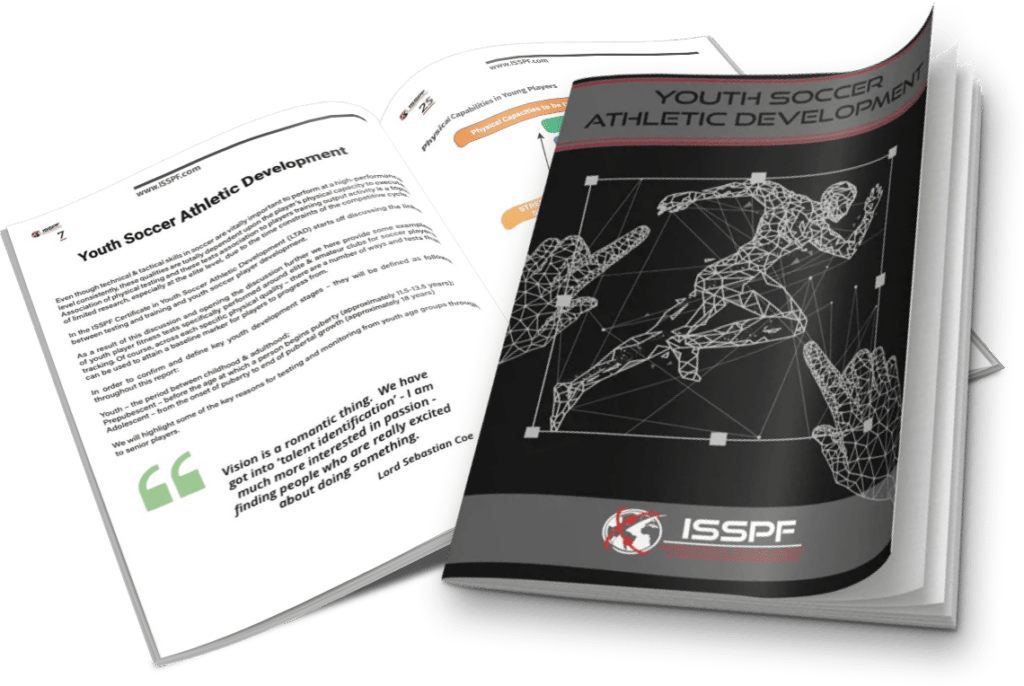Maximizing Performance
The Essential Triad for Elite Football Players – Readiness to Train, Recovery, and Preparation
Written By: Dr. Nikos Koundarakis (High Performance Coach & Physiologist)
Football, as a sport has evolved significantly, demanding a comprehensive understanding from coaches to facilitate the success of elite players. Beyond tactical and technical expertise, coaches must prioritize three key factors: readiness to train, recovery, and effective preparation.
Having worked at the elite level of the game for a number of years and experienced player health, fitness and lifestyle aspects of performance, this article aims to shed light on the academic aspects surrounding these vital components, highlighting their significance in optimizing the performance of elite football players.
Discover Our Online Courses
Readiness to Train
Readiness to train encompasses an athlete’s physiological and psychological state before engaging in a training session. Coaches must recognize that players’ performance and susceptibility to injury are directly influenced by their readiness.
Establishing a structured approach to evaluate and enhance readiness is crucial for achieving optimal training outcomes. Research indicates that monitoring factors such as sleep quality, nutrition, hydration, and stress levels is essential for accurately assessing readiness.
Sleep Quality: Adequate sleep is a critical but often underestimated component in player preparation. The significance of obtaining sufficient and high-quality sleep cannot be overstated, as it has a profound impact on an athlete’s overall performance.
Research has consistently shown that sleep deprivation can lead to a range of negative effects, including reduced cognitive function, impaired decision-making abilities, and diminished physical performance.
Cognitive function, encompassing memory, attention, and problem-solving skills, is essential for football players to make split-second decisions on the field.
Lack of sleep compromises these cognitive abilities, making it challenging for players to assess and respond effectively to dynamic game situations. Sleep deprivation can lead to decreased focus and attention, hampering the player’s ability to analyse the game, anticipate movements, and make accurate passes or shots.
Additionally, decision-making abilities are adversely affected, resulting in suboptimal choices regarding positioning, timing, and strategy. Physical performance is also significantly affected by inadequate sleep.
Football requires explosive bursts of speed, agility, and endurance, all of which rely on the body’s ability to function optimally. Sleep deprivation hampers the body’s ability to recover and repair itself, leading to decreased muscle strength and endurance. Furthermore, insufficient sleep impairs coordination, reaction time, and motor skills, making it harder for players to execute precise movements and maintain peak physical performance throughout a match.
Coaches play a crucial role in educating players about the importance of obtaining the recommended 7-9 hours of quality sleep per night.
By prioritizing sleep as an integral part of player preparation, coaches can ensure optimal physiological and psychological readiness. They can emphasize the role of sleep in promoting physical recovery, muscle growth, and injury prevention. Moreover, coaches can highlight the impact of sleep on cognitive processes, emphasizing that quality sleep enhances focus, decision-making, and overall mental sharpness.
To support players in achieving adequate sleep, coaches can collaborate with the team’s medical staff or sports scientists to develop strategies and interventions.
This may include implementing a structured sleep schedule, providing guidelines on sleep hygiene practices, and creating a conducive sleep environment. Coaches can educate players about the importance of establishing a consistent sleep routine, avoiding stimulating activities before bed, and creating a dark, quiet, and comfortable sleeping environment.
Furthermore, coaches can encourage players to adopt pre-sleep routines that promote relaxation and signal the body to prepare for sleep.
These may include practices such as winding down with calming activities like reading or listening to soft music, practicing relaxation techniques like deep breathing or progressive muscle relaxation, and avoiding the use of electronic devices that emit blue light, which can disrupt sleep patterns.
By prioritizing sleep as an essential element of player preparation, coaches can help players optimize their physiological and psychological readiness for training and competition. The investment in adequate sleep not only enhances performance on the field but also promotes overall well-being and long-term athletic development.
Therefore, coaches should continue to educate players about the significant role of sleep, encourage healthy sleep habits, and provide the necessary support to ensure that players prioritize and prioritize quality sleep as a non-negotiable aspect of their training and preparation regimen.
Nutrition and Hydration: Proper nutrition and hydration form the cornerstone of optimizing player readiness for elite football performance. A well-balanced diet, consisting of macronutrients, vitamins, and minerals, is of utmost importance as it provides the essential fuel for training, recovery, and overall physical and mental well-being.
Coaches play a critical role in ensuring that players receive the necessary nutritional guidance and support. By collaborating with nutrition experts, coaches can create individualized meal plans tailored to meet each player’s specific needs.
These personalized plans take into account factors such as the player’s position, training load, body composition goals, and dietary preferences or restrictions.
A balanced diet for football players typically includes a suitable distribution of carbohydrates, proteins, and fats. Carbohydrates serve as the primary source of energy, fuelling high-intensity activities on the field.
Coaches and nutrition experts work together to determine the optimal carbohydrate intake for each player, considering factors such as training intensity, duration, and the timing of meals in relation to training sessions or matches. Protein plays a crucial role in muscle repair, growth, and recovery. It facilitates the adaptation process after intense training sessions or matches. Coaches ensure that players consume adequate amounts of high-quality protein sources, such as lean meats, fish, dairy products, legumes, and plant-based protein options, to support muscle repair and development.
In addition to macronutrients, players require a wide range of vitamins and minerals to support various physiological functions. These micronutrients play critical roles in energy production, immune function, bone health, and muscle contraction. Coaches should encourage players to incorporate a variety of fruits, vegetables, whole grains, and other nutrient-dense foods into their diet to ensure an adequate intake of these essential micronutrients.
Hydration is equally vital for player readiness. Even mild dehydration can have detrimental effects on cognitive function and physical performance. Coaches educate players about the importance of maintaining proper hydration levels before, during, and after training sessions and matches. Encouraging regular fluid intake and providing guidelines on the appropriate types and quantities of fluids can help players stay adequately hydrated.
Coaches can collaborate with sports scientists or nutrition experts to implement strategies for assessing hydration status. This may involve monitoring urine colour or utilizing technologies such as urine specific gravity measurement or sweat rate analysis. These methods help determine individual hydration needs and guide players in maintaining an optimal fluid balance.
It is important to note that nutritional needs may vary depending on factors such as player age, gender, body composition, and individual goals. Therefore, coaches must work closely with nutrition experts to develop customized plans that address these unique considerations. Regular monitoring and adjustments to the meal plans ensure that players receive the necessary nutrients to support their readiness to train and perform at their best.
By emphasizing proper nutrition and hydration as integral components of player preparation, coaches enhance players’ physical and mental readiness. Investing in education, guidance, and support in these areas not only leads to immediate performance improvements but also contributes to long-term health, injury prevention, and overall athletic development. Therefore, coaches should consistently prioritize nutrition and hydration as vital aspects of their training and preparation programs, ensuring that players have the fuel and hydration necessary to excel in the demanding world of elite football.
Stress Management
Stress management is a crucial aspect of optimizing an athlete’s psychological readiness. The ability to effectively handle stress directly impacts a player’s overall performance and readiness to train.
Recognizing this, coaches play an essential role in encouraging players to adopt stress-reduction techniques and strategies that can enhance their mental well-being and preparedness. One effective approach is to promote mindfulness among players.
Mindfulness involves being fully present in the moment and aware of one’s thoughts, emotions, and bodily sensations without judgment. Coaches can introduce mindfulness practices to players, such as meditation or mindful breathing exercises, which can help them develop a greater sense of calmness and resilience in the face of stressors.
By incorporating mindfulness into the training routine, players can learn to stay focused, manage distractions, and maintain a positive mindset.
Deep breathing exercises are another valuable tool in stress management. Controlled breathing techniques, such as diaphragmatic breathing or box breathing, can help players relax, reduce tension, and regulate their emotions. Coaches can guide players through these exercises during training sessions or provide resources for players to practice them on their own.
By incorporating deep breathing techniques into their daily routine, players can enhance their ability to manage stress and remain composed during high-pressure situations.
Visualization is a powerful technique that can aid in stress reduction and enhance psychological readiness. Coaches can encourage players to engage in visualization exercises where they vividly imagine themselves successfully executing specific skills or strategies on the field.
By mentally rehearsing these scenarios, players can build confidence, improve focus, and reduce anxiety. Visualization can be incorporated into pre-training or pre-match routines, helping players establish a positive mindset and enhance their readiness to perform.
Creating an environment that fosters open communication and psychological support is paramount for managing stress effectively. Coaches should encourage players to express their concerns, fears, or anxieties without judgment.
By actively listening and providing empathetic support, coaches can help players navigate through challenging situations and develop effective coping strategies. Regular check-ins and team meetings can serve as opportunities for players to discuss their stress levels and seek guidance when needed.
Coaches can also collaborate with sports psychologists or mental health professionals to provide additional support and resources for players.
It is important for coaches to recognize the signs of excessive stress in their players. Symptoms such as decreased motivation, irritability, sleep disturbances, or changes in appetite may indicate that a player is experiencing high levels of stress.
Coaches should be vigilant and responsive to these signs, offering appropriate interventions or referrals to mental health professionals if necessary. By addressing stress proactively, coaches can help players maintain their readiness to train and perform at their best.
By fostering an environment that promotes open communication and psychological support, coaches can ensure that excessive stress does not compromise players’ readiness to train. By prioritizing the psychological well-being of their players, coaches contribute to creating a positive and resilient team culture, enabling players to perform at their peak potential.
Soccer Science & Performance Online Sport Science Course
Recovery
Recovery constitutes a fundamental aspect of an elite football player’s journey towards peak performance. It encompasses strategies aimed at repairing and rejuvenating the body following intense training or competition.
Neglecting adequate recovery can lead to increased injury risks, decreased performance, and eventual burnout. Coaches must emphasize the following components to maximize player recovery:
- Active Recovery: Engaging in low-intensity activities, such as light aerobic exercises or mobility drills, promotes blood flow and aids in the removal of metabolic waste products. Active recovery sessions between training sessions or matches have demonstrated accelerated recovery and reduced muscle soreness.
- Nutrition for Recovery: Proper nutrition plays a pivotal role during the recovery phase. Consuming a combination of carbohydrates and protein within the first 30-60 minutes post-training or competition replenishes glycogen stores, repairs muscle tissue, and stimulates muscle protein synthesis. Coaches should educate players about the importance of consuming nutrient-dense meals or snacks with the appropriate macronutrient ratios to facilitate optimal recovery.
- Rest and Regeneration: Allowing sufficient time for rest and sleep is crucial for the body’s recovery process. Coaches should collaborate with players to establish structured rest periods within their training schedules, advocating for adequate sleep duration to optimize physiological and psychological recovery.
Preparation
Effective preparation encompasses a holistic approach that addresses physical, technical, and tactical elements, enabling players to excel in competitive scenarios. Coaches must implement evidence-based strategies to ensure players are adequately prepared for the demands of elite-level football.
- Periodization: Implementing a well-structured periodization plan that considers the varying demands of the football season is paramount. Coaches should employ periodization models that incorporate progressive overload, planned recovery periods, and skill-specific training to optimize performance while mitigating the risk of overtraining and injury.
- Individualized Training: Recognizing that each player possesses unique strengths, weaknesses, and goals is critical for effective preparation. Coaches should tailor training programs to address individual needs, providing targeted exercises and drills to enhance specific skill sets and physical attributes.
- Psychological Preparation: Elite football players must possess strong mental fortitude to excel under pressure. Coaches should integrate psychological training techniques, such as goal setting, visualization, and mindfulness, to enhance players’ focus, resilience, and decision-making abilities.
Conclusion
To unlock the full potential of elite football players, coaches must prioritize readiness to train, recovery, and effective preparation. By understanding the academic underpinnings of these crucial components, coaches can establish evidence-based training programs that optimize player performance while minimizing the risk of injury and burnout.
What Next?
Transform Your Career with ISSPF: Unleash Your Potential through Cutting-Edge Courses
Are you ready to embark on a transformative journey that will shape your professional future? Look no further than ISSPF!
🔥 We are the leading online platform for top-notch courses designed to empower individuals like you. Join us today and unlock a world of endless possibilities! 🌟
Why Choose ISSPF?
Stay Ahead of the Curve: In today’s rapidly evolving job market, staying up-to-date with the latest skills and knowledge is crucial. ISSPF offers a diverse range of courses that cover emerging trends, ensuring you remain ahead of the curve in your field. 📈 Whether you’re seeking to enhance your soccer coaching details, or explore the exciting world of coaching science, we have the perfect course for you. 💡
World-Class Instructors: At ISSPF, we understand that the quality of education is paramount. That’s why we’ve handpicked a team of industry experts, thought leaders, and seasoned professionals to guide you through each course. Benefit from their wealth of experience, practical insights, and personalized feedback, as they impart invaluable knowledge to help you excel in your chosen area of the sport. 🎓
Flexible Learning Options: We believe that learning should adapt to your lifestyle, not the other way around. ISSPF offers flexible learning options that fit seamlessly into your busy schedule. Our online courses are available 24/7, allowing you to learn at your own pace from the comfort of your home or office. Whether you prefer to immerse yourself in intensive study or follow a more relaxed learning path, we’ve got you covered.⌛️
Practical, Hands-On Approach: We prioritize interactive learning on our courses, with multiple choice questions, online modules & assignments enabling you to acquire tangible skills that you can immediately implement in your professional coaching life. 💪
Industry-Recognized Certifications: Stand out from the crowd with highly endorsed certifications from ISSPF. Our courses are designed to equip you with the expertise that gives you a competitive edge and knowledge. Add these credentials to your resume and open doors to exciting career opportunities. 🏆
Why Take Our Courses?
Career Advancement: Whether you’re a seasoned professional looking to climb the coaching ladder or an ambitious individual seeking further development in a key area of soccer coaching or performance development, ISSPF courses provide the stepping stones to advance your career. Acquire practical examples, in-demand skills, and gain specialized further knowledge, whilst broadening your horizons to unlock new concepts. 🚀
Personal Growth: Learning is a lifelong journey, and ISSPF courses offer the perfect platform for personal growth and self-improvement. Challenge yourself, expand your horizons, and embrace continuous coaching and performance learning to unleash your full potential. 🌱
Future-Proof Your Skills: The online learning community revolution is reshaping industries across the globe. ISSPF equips you with the essential skills needed to thrive in the ever progressing soccer coaching and performance industry.🔒
🌐 Don’t let the opportunity for professional growth pass you by. Visit www.ISSPF.com today and embark on a transformative learning experience that will assist you in your coaching or performance practitioning career. Unlock your potential and join a community of learners who are committed to excellence. Your journey to success starts here! 🌟💼✨
Share this article:















